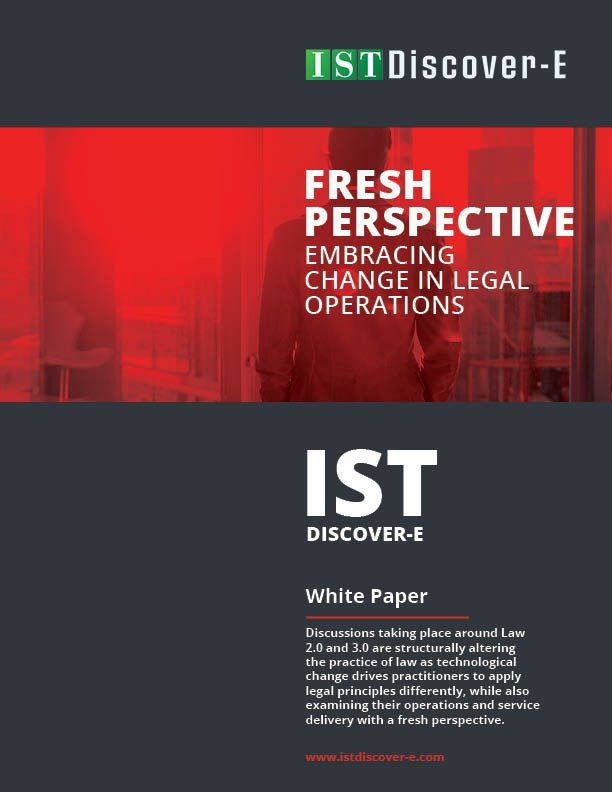Embracing Change in Legal Operations
A Fresh Perspective
The concept of a “New Normal” in legal practice reflects the view that modern technology, design, and social innovations are creating stronger lawyers and more informed clients. Indeed, discussions taking place around Law 2.0 and 3.0 are structurally altering the practice of law as technological change drives practitioners to apply legal principles differently, while also examining their operations and service delivery with a fresh perspective.
It is critical for law departments and law firms to focus on maximizing value and achieving optimal performance in support of broader organizational and client goals. But adapting operations strategy to flex and scale at the speed of innovation is becoming fundamental to both solid growth and survival.
While some of the traditional arenas of legal practice, such as advocacy and oral argument may not be greatly impacted, areas such as knowledge management, eDiscovery, operational analytics, information security, business development, and general administration must be invigorated with equal modernization.
To meet and get ahead of nascent challenges, law departments and law firms turn to consultants to change their operating models, whether with a large-scale, end-to-end transformation or a targeted assessment of a particular area. Legal Operations Consultants can perform myriad beneficial utilities depending on self-identified or assessed need, but the process by which recommendations are realized is most crucial.
A quick search yields hundreds of organizations promising to drive efficiency, improve processes, enhance technology, reduce bottlenecks, reduce spend … the list goes on and on. But choosing a consultant to partner with your team and enact a multi-phased program that prioritizes user adoption as much as risk management is what results in elemental change.
Consultants with a data-driven approach that balances firm culture, client needs, ROI, strategic vision and critical requirements under a non-disruptive delivery model increases the chance of both immediate and long-term success. However, two questions to consider, and the primary differentiator among consultants, are, How long will an operational transformation take?; and, How will I know the transformation is successful? The answer to both of those questions is time and dedication.
When sourcing consultants to address today’s challenges, the chosen consultant should be a dedicated resource to the department or firm. Too many consulting organizations present a limitless amount of resources to perform analysis of current practices but reject responsibility for follow-through, claiming confirmation of success to be too nuanced. A dedicated consultant who takes the time to embed themselves within a department or firm will perform requisite analysis, present solutions to immediate problems, identify areas for improvement and remain hands-on until the department or firm has achieved stated goals.
These goals may include:
- Defining a law department vision and strategy that aligns with the business and stakeholder needs.
- Using data and data driven language to track and deliver value to the business.
- Instilling visibility, flexibility, predictability, transparency, and control over external legal spend.
- Ensuring the right work is being done by the right people at the right price.
- Fostering collaborative ways of pricing and unbundling legal work to the right third-party vendors.
- Upskilling the team to communicate and manage high-value projects more effectively.
- Moving technology systems to unified platforms that align with organizational needs.
To complement our already robust support services provision, IST has generated considerable enthusiasm in the national legal marketplace for our Legal Operations Consulting, eDiscovery, Forensic Analysis, Managed Document Review and Court Reporting divisions.
Veteran consultants are provided by IST to help augment the internal capabilities of law firms and legal departments allowing them to draw upon decades of foundational knowledge and key operational specializations. IST’s team can aid in strategic organizational decisions, including both transformational assignments and short-term, project-based initiatives.
Our consultants bring substantial proficiency in integrating key processes to best-fit firms of varying size in order to put them on a solid path to transformational growth. Our experience and track record of success in synthesizing seemingly disparate processes into a working model for progress in legal practices provides an invaluable national resource to law firm managing partners and other senior leaders.Using conceptual analytics helps organize and assess the semantic content of large, diverse and/or unknown sets of documents. Unlike structured analytics, which relies on the specific structure of the content, conceptual analytics focuses on related concepts within documents, even if they don’t share the same key terms and phrases. Common features of conceptual analytics are clustering and active learning, which can cut down on review time by more quickly assessing your document set.





